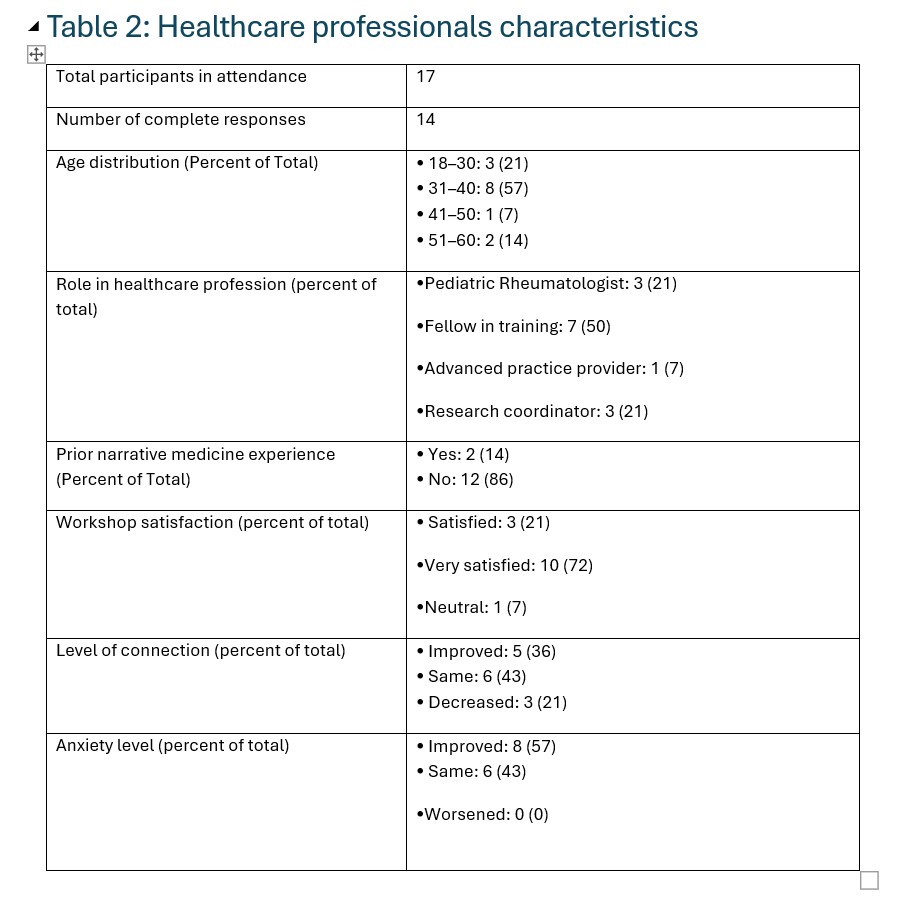Session Information
Session Type: Poster Session B
Session Time: 10:30AM-12:30PM
Background/Purpose: Patients with chronic diseases often report poor health-related quality of life (QOL) and impaired psychosocial functioning. The current model of healthcare in rheumatology emphasizes evidence-based medicine but does not always address broader dimensions of patient well-being, psychological needs, and QOL. Narrative medicine (NM) is a valuable tool that can be used in healthcare by patients, caregivers, and health care professionals to further explore and understand experiences with illness and caregiving. Allowing patients and caregivers to reconstruct their experiences through self-reflection can be cathartic and has been shown to improve patient reported outcomes and QOL
Methods: The Childhood Arthritis and Rheumatology Research Alliance (CARRA) NM workgroup conducted two 60-minute workshops at its 2025 annual meeting. The first workshop was designed for patients and caregivers affected by rheumatic diseases, while the second targeted pediatric rheumatology healthcare professionals (HCPs). Each workshop was led by facilitators trained in NM. Participants completed a pre-workshop survey to assess their baseline knowledge and prior experience with NM interventions. A post-workshop survey was administered to evaluate feasibility, to understand participant perceptions of intervention, and to assess immediate changes in their feelings of connectedness and anxiety.
Results: Twenty-five participants attended the patient-caregiver workshop, and 17 participants attended the HCP workshop. Patient-Caregiver Workshop (Table 1): Twenty-four of 25 participants completed the survey. One participant who was under the age of 18 did not take the survey and three surveys were incomplete. Of the 21 valid responses, seven were completed by patients and the remainder by caregivers. Four of the 21 participants had prior NM experience. All respondents reported being satisfied (n=7) or very satisfied (n=14) with the workshop. Free-text responses reflecting participants’ experiences and feelings are depicted in Figure 1. HCP Workshop (Table 2): Participants included pediatric rheumatologists, advanced practice providers, fellows, and research coordinators. Fourteen of 17 participants completed the survey. Thirteen out of 14 participants reported being satisfied (NfX) or very satisfied (NfX) with the workshop. Free-text responses depicting participant experiences and feelings are depicted in Figure 1.
Conclusion: The NM workshops were well received by patients, caregivers, and HCPs with high satisfaction rates. While most participants had no prior NM experience, many respondents found value in the workshop. Further NM interventions with larger samples are required to adequately explore contributing factors impacting participant degree of connection and impact on anxiety. These findings support the feasibility and acceptability of NM interventions in pediatric rheumatology settings.
 Patient and caregiver characteristics
Patient and caregiver characteristics
.jpg) Healthcare professional characteristics
Healthcare professional characteristics
.jpg) Experiences of all participants
Experiences of all participants
To cite this abstract in AMA style:
Dhanrajani A, Drew J, Edison S, Moorthy L, Goh I, Garceau A, Saltzman H, Wells C, Levy A. Fostering connections in Pediatric Rheumatology: A Narrative medicine intervention [abstract]. Arthritis Rheumatol. 2025; 77 (suppl 9). https://acrabstracts.org/abstract/fostering-connections-in-pediatric-rheumatology-a-narrative-medicine-intervention/. Accessed .« Back to ACR Convergence 2025
ACR Meeting Abstracts - https://acrabstracts.org/abstract/fostering-connections-in-pediatric-rheumatology-a-narrative-medicine-intervention/
